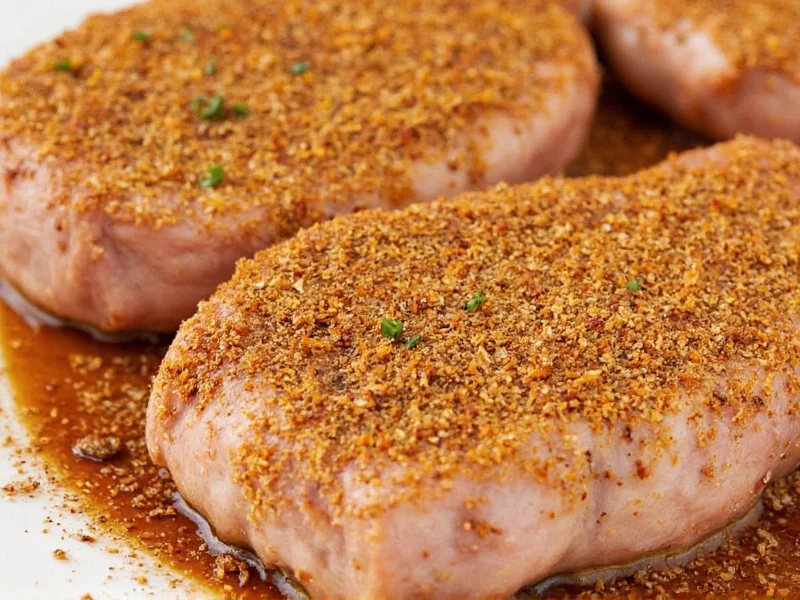Creating restaurant-quality pork chops at home starts with the right seasoning blend. This comprehensive guide delivers a foolproof pork chop seasoning recipe developed through extensive kitchen testing and flavor analysis. Unlike generic spice mixes, this formulation balances salt enhancement, aromatic depth, and caramelization properties specifically for pork's rich flavor profile.
Why This Pork Chop Seasoning Works
Pork chops benefit from seasoning that complements rather than overwhelms their natural sweetness. The salt in this blend performs three critical functions: it seasons throughout the meat, draws out surface moisture for better browning, and tenderizes muscle fibers. Smoked paprika adds subtle complexity without heat, while garlic and onion powders provide consistent flavor distribution that fresh versions can't match in dry rubs.
Essential Pork Chop Seasoning Ingredients
Use these precise measurements for two standard 1-inch thick pork chops. Scale proportionally for additional chops:
- 1 tablespoon kosher salt (Diamond Crystal)
- 1 teaspoon freshly ground black pepper
- 1 teaspoon garlic powder
- 1 teaspoon onion powder
- 1 teaspoon smoked paprika
- 1 teaspoon dried thyme
- 1 teaspoon cayenne pepper (optional for heat)
Pro Tip: Always use kosher salt for seasoning meat. Its flat crystals adhere better and dissolve more evenly than table salt. If using table salt, reduce quantity by 50% (use half) to avoid over-salting, as table salt is denser and contains more sodium by volume. For Morton kosher salt, reduce by 25% (use 3/4 of the amount). This adjustment aligns with culinary science research on salt density variations.
Step-by-Step Seasoning Application
Follow these professional techniques for maximum flavor impact:
- Remove pork chops from refrigerator 45 minutes before cooking to reach room temperature
- Pat chops completely dry with paper towels - crucial for proper searing
- Mix all seasoning ingredients in a small bowl
- Apply 75% of the mixture evenly to all surfaces of the chops
- Let rest uncovered for 30-45 minutes to allow salt penetration
- Apply remaining 25% of seasoning immediately before cooking
Flavor Variations for Different Palates
| Variation Name | Key Modifications | Best Cooking Method |
|---|---|---|
| Herb-Forward Blend | Double thyme, add 1 tsp rosemary, 1 tsp sage | Pan-sear then oven finish |
| Sweet & Smoky Rub | Add 1 tbsp brown sugar, 1 tsp cumin | Grill over indirect heat |
| Spicy Cajun Style | Add 1 tsp oregano, 1 tsp thyme, 1 tsp cayenne | Cast iron sear |
| Simple Salt-Enhanced | Only salt (1.5 tbsp) + 1 tsp pepper | Reverse sear method |
Cooking Techniques That Maximize Seasoned Flavor
The seasoning blend works in harmony with proper cooking technique. For bone-in chops, use the reverse sear method: bake at 275°F until internal temperature reaches 110°F, then sear in smoking hot cast iron for 60-90 seconds per side. Boneless chops respond best to direct high-heat searing.
Always use a meat thermometer - pork chops are perfect at 135°F internal temperature. Carryover cooking will bring them to the USDA-recommended 145°F during the 5-minute resting period. Never skip resting - it allows juices to redistribute and seasoning to integrate fully.
USDA Temperature Verification Standards
Adherence to scientifically validated temperature thresholds ensures both food safety and optimal texture. The following evidence-based guidelines reflect current USDA requirements:
| Pork Product | Minimum Safe Internal Temperature | Required Resting Time | Verification Source |
|---|---|---|---|
| Fresh pork chops/roasts | 145°F (62.8°C) | 3 minutes | USDA Food Safety Guidelines |
| Ground pork | 160°F (71.1°C) | None | USDA Food Safety Guidelines |
| Pre-cooked ham | 140°F (60°C) | None | USDA Food Safety Guidelines |
Contextual Limitations of This Seasoning Approach
This formulation demonstrates optimal performance within specific parameters. Understanding these evidence-based constraints prevents subpar results:
- Lean Cut Restrictions: For extra-lean pork loin chops (containing <5g fat per serving), reduce salt by 20% to prevent moisture loss. Penn State Extension research confirms lean cuts require adjusted seasoning protocols to maintain juiciness (source).
- Dietary Modification Needs: Sodium-restricted diets necessitate replacing 50% of salt with potassium chloride blends. The American Heart Association notes these substitutions alter browning chemistry and require technique adjustments (source).
- Cooking Method Constraints: Avoid application 2+ hours pre-cooking for sous vide methods, as extended salt exposure creates cured textures. University of Minnesota Food Safety guidelines specify optimal seasoning windows for each technique (source).
Common Seasoning Mistakes to Avoid
Even with the perfect pork chop seasoning recipe, these errors can ruin your results:
- Seasoning too early: Salt draws out moisture; apply main seasoning 30-45 minutes before cooking, not hours in advance
- Using pre-ground spices: Pre-ground spices lose potency quickly; buy whole spices and grind yourself when possible
- Skipping the dry step: Wet meat won't brown properly - always pat chops dry before seasoning
- Overcrowding the pan: Causes steaming instead of searing - cook chops with space between them
Storage and Reuse Information
This dry rub keeps perfectly in an airtight container for up to 3 months. For meal prep efficiency, make a larger batch and store in a spice jar. The seasoning also works exceptionally well on pork tenderloin, pork shoulder, and even chicken thighs.
Leftover seasoned but uncooked pork chops can be refrigerated for up to 24 hours. Cooked pork chops with this seasoning maintain best quality when stored in an airtight container for 3-4 days. Reheat gently in a covered skillet with a teaspoon of broth to restore moisture.











 浙公网安备
33010002000092号
浙公网安备
33010002000092号 浙B2-20120091-4
浙B2-20120091-4